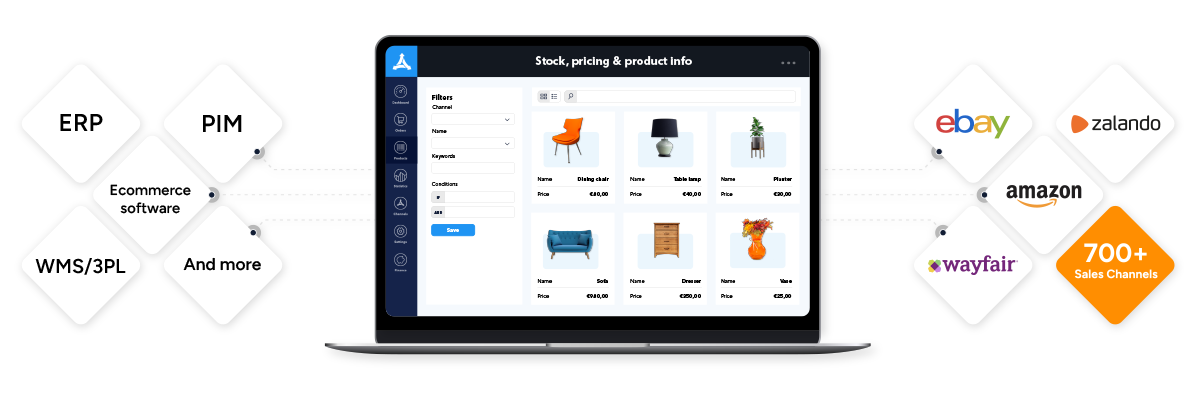Ecommerce automation: Simplify, optimize, and sell more!

Maintaining a competitive edge in ecommerce can be challenging in today's fast-moving digital sphere, yet automation offers an effective solution to streamline operations and enhance marketing efforts.
This guide will examine what ecommerce automation is, its advantages, and the different kinds of software available.
What is ecommerce automation?
Ecommerce automation refers to using technology to automate repetitive and time-consuming tasks in the ecommerce process. It encompasses various areas such as inventory management, order processing, customer communication, and marketing, aiming to eliminate manual intervention from these processes.
Imagine no longer needing to manually update stock levels or write product listings by hand. Thanks to ecommerce automation, these tedious tasks have become obsolete. Integrated ecommerce systems sync your inventory across all sales channels for accurate product availability. According to a survey by the National Retail Federation, nearly 68% of shoppers expect real-time inventory information, and 72% anticipate accurate product availability across sales channels. Meeting these expectations requires seamless synchronization of inventory data to minimize discrepancies that lead to customer frustration.
Ecommerce automation goes beyond operational tasks. Listing automation tools make creating and updating product listings effortless. In marketing, automated email campaigns can nurture leads without constant oversight, while automated retargeting based on user behavior guarantees potential customers are never forgotten, leading to more sales opportunities.
The benefits of ecommerce automation
Ecommerce automation provides businesses looking to excel in the digital marketplace many advantages.
Efficiency
Automation streamlines ecommerce operations by automating repetitive and time-consuming tasks, freeing your team to focus on more strategic and creative aspects of their business.
One example would be Shopify, an ecommerce platform offering automation features like order processing, inventory management, and marketing automation via apps and integrations - giving merchants more time for product listings, marketplace strategy planning, and improving overall customer experiences.
Enhanced customer experience
Real-time inventory updates and automated order processing are crucial to creating an exceptional customer experience. Amazon excels in this regard by employing automation in their fulfillment centers to ensure orders are swiftly picked, packed, and shipped - contributing significantly to high customer satisfaction scores for this ecommerce giant.
According to research conducted by PwC, 73% of consumers consider customer experience an integral component in purchasing decisions.
Automated marketing
Automated marketing campaigns are an invaluable way to engage and reach your target audience. Wayfair, an acclaimed online furniture and home decor retailer, efficiently employs automation in its ecommerce operations.
Wayfair leverages artificial intelligence-powered recommendation engines to recommend furniture and decor items based on customers' browsing and purchase history, improving shopping experiences by increasing chances of customers finding items that reflect their preferences.
Automation offers cost savings
Automation reduces manual labor requirements, leading to significant cost savings over time. Ocado, a British online supermarket employing highly automated warehouse systems to fulfill customer orders, uses robots to pick and pack groceries, significantly cutting labor costs and increasing order processing efficiencies.
According to research conducted by Aberdeen Group, warehouses utilizing automated systems are 76% more likely to reach an inventory accuracy of 99% or higher. Furthermore, such businesses are 36% more likely to reduce labor costs annually by an average of 3% and 40% more likely to consistently ship orders within one day of placement.
Scalability
As your ecommerce business scales up, automation can quickly adapt to meet increasing demands. Etsy provides automated features like shipping labels and inventory management for its sellers; this enables small artisans to expand their businesses without being bogged down by administrative duties.
According to research by Deloitte, 79% of companies with superior supply chains were more likely to experience above-average revenue growth.
Decision-making based on data
Automation tools generate valuable data that can inform strategic decisions. A global retail giant, Walmart uses automation to collect and analyze customer information to optimize inventory levels, enhance supply chain management practices, and tailor marketing campaigns according to individual customer preferences.
Types of ecommerce automation software
Now that we understand the significance of ecommerce automation let's explore six types of software that could transform our businesses:
1. Inventory tracking software
Inventory management software is essential to keeping products stocked and ready to deliver to customers, with companies such as Zappos relying on advanced inventory systems like these to track thousands of SKUs in real time and ensure speedy deliveries with high customer satisfaction rates.
According to research by the National Retail Federation, inventory shrinkage costs retailers in the US approximately $46.8 billion annually. However, proper inventory management and automation software can significantly lower these losses.
2. Order processing automation solutions
Order processing is essential to creating an enjoyable customer experience, and Amazon stands as an exemplar in this regard with its highly automated order processing system. Their warehouses use robotics and automation to pick, pack, and ship orders with remarkable speed and precision.
According to research by McKinsey, automation in order processing can significantly decrease errors by up to 90% and increase accuracy rates to 99.9%.
3. Customer Relationship Management (CRM)
CRM software automates customer interactions and helps businesses build lasting client relationships. Salesforce, one of the premier CRM providers, equips businesses with tools that automate lead nurturing, track customer interactions, and personalized communication at scale - helping companies maintain strong customer relations.
In ecommerce, having access to meaningful customer data can shorten the sales cycles by 8-14%. A CRM provides a wealth of metrics, helping salespeople to move quickly and bring in more customers.
4. Email marketing automation solutions
Email marketing remains an effective strategy for engaging customers. Casper Mattress Company uses email marketing automation to deliver personalized product suggestions and exclusive offers directly to customers based on their browsing activity and purchase history.
Personalized emails are opened 82% more than generic emails while segmenting campaigns can increase revenue by up to 760%. Simple things such as addressing your customer by name can increase email open rates by 35%.
Email automation enables customers to learn more about your brand while encouraging repeat purchases or reminding them why they purchased from you in the first place.
5. Marketing automation suites
Comprehensive marketing automation suites offer an array of tools for running complex campaigns. Adobe Marketing Cloud stands out as an example, providing solutions such as lead scoring, campaign management, and in-depth analytics - and major companies like Microsoft and T-Mobile utilize it as part of their marketing initiatives.
6. Marketplace integration software
Multichannel selling has become essential, and marketplace integration software simplifies this process. Integration software like ChannelEngine offers brands, retailers, and distributors an easy solution for managing their ecommerce channels from one central place. Map products quickly to various channels as your listings change over time.

Integrating these types of ecommerce automation software into your business operations can reap tangible advantages, as these real-life examples and statistics illustrate. Whether you're an independent online retailer or a global ecommerce giant, automation can help optimize processes, improve customer experiences, and drive revenue growth.
Contact us to explore how our solutions can help your business flourish in today's digital marketplace.


